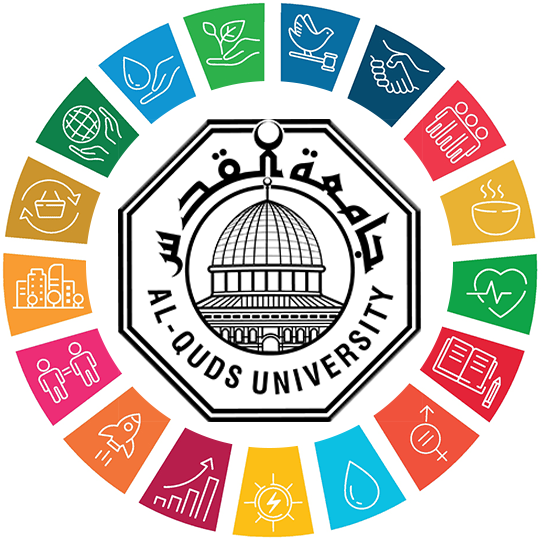I. Introduction
In response to the urgent need for climate action and environmental responsibility, Al-Quds University is committed to reducing its carbon footprint and fostering a culture of sustainability across its operations. This Climate Action Plan outlines a series of SMART (Specific, Measurable, Achievable, Relevant, and Time-bound) objectives that will guide the university’s efforts to minimize its environmental impact in the area of operations.
II. SMART Objectives for Climate Action
A. Energy Efficiency and Conservation
- Specific: Reduce campus-wide energy consumption by 20%.
- Measurable: Track energy usage through utility bills and meter readings.
- Achievable: Implement energy conservation measures, such as upgrading to energy-efficient lighting and equipment, optimizing heating, ventilation, and air conditioning (HVAC) systems, and promoting energy-saving behaviors among students and staff.
- Relevant: Lower energy consumption contributes to reduced greenhouse gas emissions and operational costs.
- Time-bound: Achieve the targeted reduction within five years.
B. Renewable Energy
- Specific: Meet 25% of the university’s energy needs through renewable sources.
- Measurable: Monitor the proportion of renewable energy in the university’s overall energy mix.
- Achievable: Install solar panels, explore partnerships with renewable energy providers, and consider purchasing renewable energy certificates (RECs).
- Relevant: Transitioning to renewable energy sources reduces the university’s dependence on fossil fuels and lowers greenhouse gas emissions.
- Time-bound: Reach the targeted renewable energy share within seven years.
C. Waste Reduction and Recycling
- Specific: Divert 50% of the university’s waste from landfills through recycling and composting programs.
- Measurable: Track waste generation and diversion rates using waste audits and data provided by waste management companies.
- Achievable: Implement a comprehensive recycling program, provide composting facilities for organic waste, and promote waste reduction practices among students and staff.
- Relevant: Waste reduction and recycling help conserve resources, reduce greenhouse gas emissions, and minimize the university’s environmental footprint.
- Time-bound: Achieve the targeted waste diversion rate within five years.
D. Sustainable Transportation
- Specific: Increase the use of sustainable transportation options among students and staff by 30%.
- Measurable: Conduct annual surveys to assess transportation choices and monitor the usage of sustainable transportation options, such as public transit, cycling, and carpooling.
- Achievable: Implement initiatives to promote sustainable transportation, such as providing discounted public transit passes, installing bike racks and showers, and facilitating carpooling networks.
- Relevant: Encouraging sustainable transportation reduces traffic congestion, greenhouse gas emissions, and air pollution.
- Time-bound: Reach the targeted increase in sustainable transportation usage within five years.
E. Green Building Practices
- Specific: Ensure that all new construction and major renovations on campus adhere to green building standards, such as LEED certification.
- Measurable: Track the number of buildings on campus that meet green building standards.
- Achievable: Adopt green building guidelines for all new construction and renovation projects, provide training and resources to architects and contractors, and integrate sustainable design features into campus buildings.
- Relevant: Green building practices reduce the environmental impact of the university’s infrastructure, promote energy efficiency, and improve indoor air quality.
- Time-bound: Achieve compliance with green building standards for all new construction and major renovations within three years.
III. Implementation and Monitoring
A. Climate Action Committee
- Establish a Climate Action Committee comprising representatives from various university departments and stakeholder groups to oversee the implementation and monitoring of the Climate Action Plan, and assigning specific responsibilities and tasks to committee members related to the various SMART objectives outlined in the plan.
- Hold regular meetings to review progress, discuss challenges, and plan future actions related to the Climate Action Plan.
B. Collaboration and Engagement
- Foster collaboration between students, faculty, staff, and the broader community to achieve the plan’s objectives.
- Encourage input and feedback from various stakeholders on the implementation and progress of the Climate Action Plan.
- Develop partnerships with local organizations, businesses, and governments to share resources, knowledge, and best practices related to climate action and sustainability.
C. Capacity Building and Training
- Provide training and capacity-building programs to university staff, faculty, and students to ensure they have the necessary skills and knowledge to implement the Climate Action Plan effectively.
- Develop educational materials and resources related to climate action, energy efficiency, waste reduction, and other relevant topics.
D. Monitoring and Reporting
- Establish a system for tracking progress towards the SMART objectives, including regular data collection, analysis, and reporting.
- Conduct periodic reviews of the Climate Action Plan to assess progress, identify areas for improvement, and make necessary adjustments to the plan.
- Publish annual progress reports on the university’s climate action initiatives, detailing achievements, challenges, and future plans.
The Climate Action Plan with SMART objectives for the operation area at Al-Quds University demonstrates the institution’s commitment to addressing climate change and promoting environmental sustainability. By focusing on specific, measurable, achievable, relevant, and time-bound objectives, the university can effectively monitor progress and ensure that its climate action efforts are on track. Through collaboration, engagement, capacity building, and regular monitoring and reporting, Al-Quds University aims to make a positive impact on the environment and lead by example in the fight against climate change.
